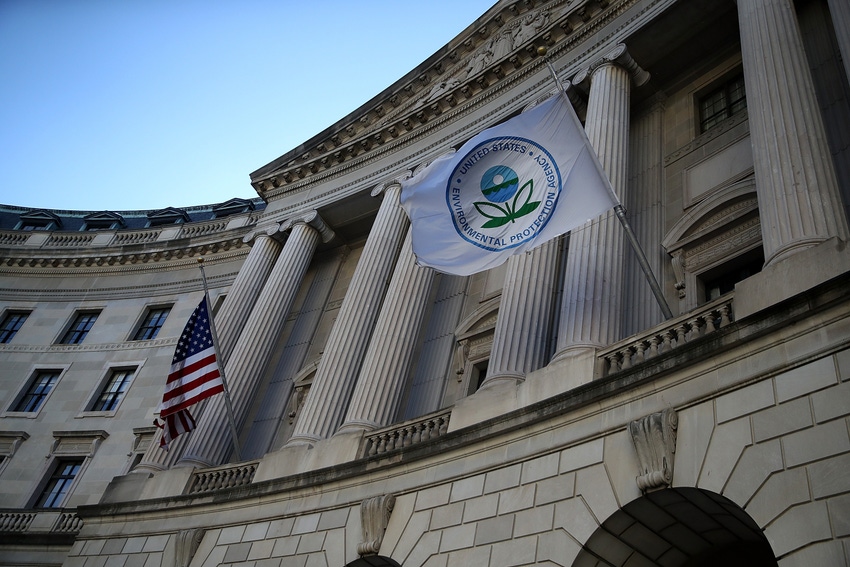Ethanol industry upset over RFS proposal
Industry groups say Trump reneged on his biofuel deal promise to restore lost demand from refinery exemptions.

On Tuesday, the U.S. Environmental Protection Agency issued a draft rule intended to fulfill President Donald Trump’s commitment to ensure that Renewable Fuel Standard (RFS) blend levels are met by reallocating gallons waived by small refinery exemptions (SREs) back into the RFS, yet it drew quick criticism from ethanol industry groups. The action also seeks comments on the rule to establish cellulosic biofuel, advanced biofuel and total renewable fuel volumes for 2020 and the biomass-based diesel volume for 2021 under the program.
While Trump’s biofuel deal would have ensured that a 15 billion gal. RFS truly meant 15 billion gal. blended, the draft proposal “fails to live up to President Trump’s promise to biofuels producers,” the Iowa Renewable Fuels Assn. (IRFA) said in a statement.
IRFA said prior to supporting the President’s Oct. 4t deal, biofuel producers and farmers were briefed by the White House and EPA that EPA would account for SREs using a three-year rolling average of actual refinery exemptions granted. The draft rule proposes using a three-year rolling average of U.S. Department of Energy (DOE) recommendations for SREs, which EPA has routinely ignored and is under no legal obligation to follow, IRFA explained.
EPA said in its release that the agency intends to grant partial exemptions in appropriate circumstances when adjudicating 2020 exemption petitions. The agency proposes to use this value to adjust the way it calculates renewable fuel percentages. “The proposed adjustments would help ensure that the industry blends the final volumes of renewable fuel into the nation’s fuel supply and that, in practice, the required volumes are not effectively reduced by future hardship exemptions for small refineries,” EPA said.
“Consistent with the statute, the supplemental notice seeks to balance the goal of the RFS of maximizing the use of renewables while following the law and sound process to provide relief to small refineries that demonstrate the need,” EPA said.
However, ethanol groups see EPA’s action -- coming only 11 days after Trump’s announcement -- as reneging on the core principle of the deal.
“Instead of standing by President Trump’s transparent and accountable deal, EPA is proposing to use heretofore secret DOE recommendations that EPA doesn’t have to follow. That means there is no guarantee that RFS exemptions will be accounted for in the RFS,” IRFA executive director Monte Shaw said.
Shaw added that the proposal asks farmers and biofuel producers to “trust that EPA will do the right thing on SREs in 2021 when they have spent the last two years weaponizing SREs to unfairly undermine the RFS.”
He stated, “It is unreasonable and counterproductive to expect Iowans to put their faith in EPA to fix the SRE problem when they were the ones who created the crisis in the first place.”
Iowa Corn Growers Assn. president Jim Greif said Trump promised to uphold the congressional intent of the RFS by addressing the demand destruction brought on by the expanded use of SREs and prospectively account for those exemptions using a three-year rolling average of actual waived gallons, beginning with the 2020 biofuel standard. Greif said the Tuesday announcement falls well short of that mark, accounting for only the DOE recommendations that EPA itself ignored.
The National Biodiesel Board (NBB) said the supplemental notice contains a never-before-discussed proposal to estimate small refinery exemptions for 2020, with no assurance that the estimate will come close to actual future exemptions. “The biodiesel industry does not believe the proposal meets President Donald Trump's Oct. 4 promise to American farmers and biodiesel producers,” NBB said.
Kurt Kovarik, NBB vice president of federal affairs, stated, “EPA is proposing a brand-new method for making the estimate – one that was never previously proposed or discussed and significantly undercounts past exemptions.
"Once again, EPA is sending a signal to the biofuel industry that the volumes it sets in annual rules can't be trusted. The proposed estimates lack transparency and undercut the President's commitment to ensure that biomass-based diesel volumes are fully met. The biodiesel industry will work diligently with all appropriate federal agencies to ensure that the final rule scrupulously fulfills President Trump's promise to soybean farmers and biodiesel producers," Kovarik added.
The Iowa Soybean Assn. (ISA) said the proposal undercuts the promise to restore biodiesel demand, with president Tim Bardole, a Rippey, Iowa, soybean farmer, adding that the announcement further erodes farmer confidence in the Trump Administration’s ability to bring closure to the all-important issue of biofuels and their place in America’s energy future.
“With today’s proposal, countless farm families and biodiesel producers will continue to face lost income and further job cuts. More facilities will close as a result of the continued inaction and the economic losses it creates,” Bardole said.
“The EPA must uphold the Administration’s commitment to restore demand based on the actual three-year SRE average, beginning with the 2020 biofuel standard and years to follow. The already-waning vitality of America’s rural communities cannot afford to keep playing regulatory games with the EPA,” Bardole added.
EPA will hold a public hearing on Oct. 30, 2019 -- followed by a 30-day comment period from the date of the hearing -- to receive public input on these issues. The agency will finalize this action later this year.
About the Author(s)
You May Also Like





